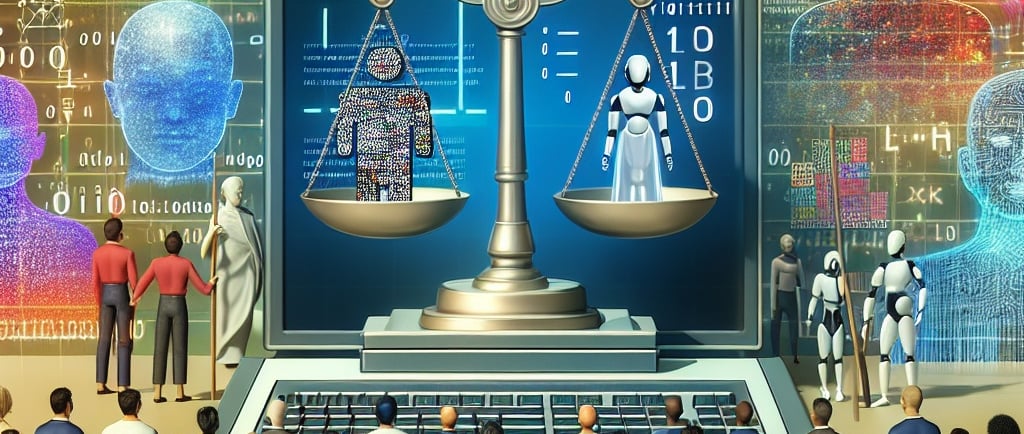
AI Ethics and Bias: Navigating the Exciting Challenges of Fair and Responsible Technology!
Learn about AI ethics and bias! Discover how AI is transforming our world and why addressing these issues is crucial for responsible technology. Uncover the challenges and solutions shaping the future of ethical AI.
TECHNOLOGY


In the whirlwind of technological advancements, artificial intelligence (AI) is a game-changer, but it brings along a crucial set of challenges: ethics and bias. As AI technologies become increasingly integral to our daily lives, understanding and addressing these issues is essential for creating a fair and responsible future. Buckle up as we dive into the fascinating world of AI ethics and bias, exploring the challenges and solutions that are shaping the future of technology.
The Growing Impact of AI
Artificial Intelligence is rapidly becoming a cornerstone of modern technology, influencing everything from healthcare to finance and even our social interactions. AI algorithms analyze vast amounts of data to make decisions, but as powerful as they are, they come with ethical dilemmas and the potential for bias that can impact individuals and societies.
1. The Ethical Dilemma: Navigating the Gray Areas
AI ethics encompasses the principles and guidelines for ensuring that AI technologies are developed and used in ways that are morally sound and beneficial. The ethical dilemmas surrounding AI often revolve around issues such as privacy, accountability, and the potential for misuse. For example, the use of AI in surveillance raises concerns about individual privacy and the extent to which personal data should be monitored and analyzed.
2. Bias in AI: A Hidden Challenge
Bias in AI refers to the unintended prejudices that can be embedded in algorithms, often reflecting historical inequalities or prejudiced data. This can lead to skewed outcomes and reinforce existing disparities. For instance, AI systems used in hiring processes may unintentionally favor certain demographics over others if the training data reflects biased historical hiring practices. Addressing these biases is crucial to ensure that AI systems make fair and equitable decisions.
3. The Quest for Fairness: Developing Inclusive AI
The quest for fairness in AI involves creating algorithms and systems that are inclusive and equitable. This requires careful consideration of the data used to train AI models and the potential impacts on various groups. Techniques like algorithmic auditing and diverse data sourcing are essential to identify and mitigate biases. By fostering transparency and inclusivity, we can work towards AI technologies that benefit everyone, regardless of background.
Exciting Solutions and Future Directions
The challenges of AI ethics and bias are being met with innovative solutions and proactive approaches. Here’s a glimpse into the exciting developments that are paving the way for a more ethical and unbiased AI future:
1. Ethical AI Frameworks: Guiding Principles
Organizations and researchers are developing ethical AI frameworks to guide the responsible development and deployment of AI technologies. These frameworks often include principles such as fairness, transparency, and accountability, helping to ensure that AI systems are designed with ethical considerations at the forefront.
2. Bias Detection and Mitigation Tools: Empowering Fairness
Advancements in bias detection and mitigation tools are helping to identify and address biases in AI systems. These tools analyze algorithms and data to uncover hidden prejudices and suggest adjustments to improve fairness. By integrating these tools into the development process, we can enhance the inclusivity and accuracy of AI systems.
3. AI for Social Good: Promoting Positive Impact
AI is also being leveraged for social good, addressing challenges like climate change, healthcare disparities, and disaster response. By focusing on projects that promote positive societal impact, AI can contribute to creating a more equitable world. For example, AI-driven initiatives are being used to improve access to healthcare in underserved regions and enhance disaster prediction and response efforts.
4. Engaging with Stakeholders: Building Trust and Collaboration
Building trust and collaboration between AI developers, policymakers, and the public is essential for addressing ethical concerns and biases. Engaging with diverse stakeholders helps to ensure that AI technologies are developed and implemented in ways that align with societal values and expectations. Collaborative efforts can lead to more robust and ethical AI systems that reflect the needs and concerns of all individuals.
A Real-World Example: The Journey of a Fair AI System
To bring these concepts to life, consider the story of a startup developing an AI-driven recruitment tool. Initially, the tool faced criticism for inadvertently favoring certain demographics due to biases in its training data. The team responded by implementing a comprehensive bias detection and mitigation strategy, including diverse data sourcing and regular algorithmic audits.
Through these efforts, the recruitment tool was refined to provide more equitable and inclusive hiring recommendations. The startup’s commitment to ethical AI not only improved the tool’s performance but also demonstrated the potential for AI to make fair and positive contributions to the workplace.
Conclusion
AI ethics and bias are crucial topics that require ongoing attention and innovation. As AI technologies continue to evolve and shape our world, addressing these challenges is essential for creating fair and responsible systems. By embracing ethical principles, developing inclusive solutions, and fostering collaboration, we can navigate the exciting journey towards a future where AI benefits everyone and contributes to a more equitable society.
